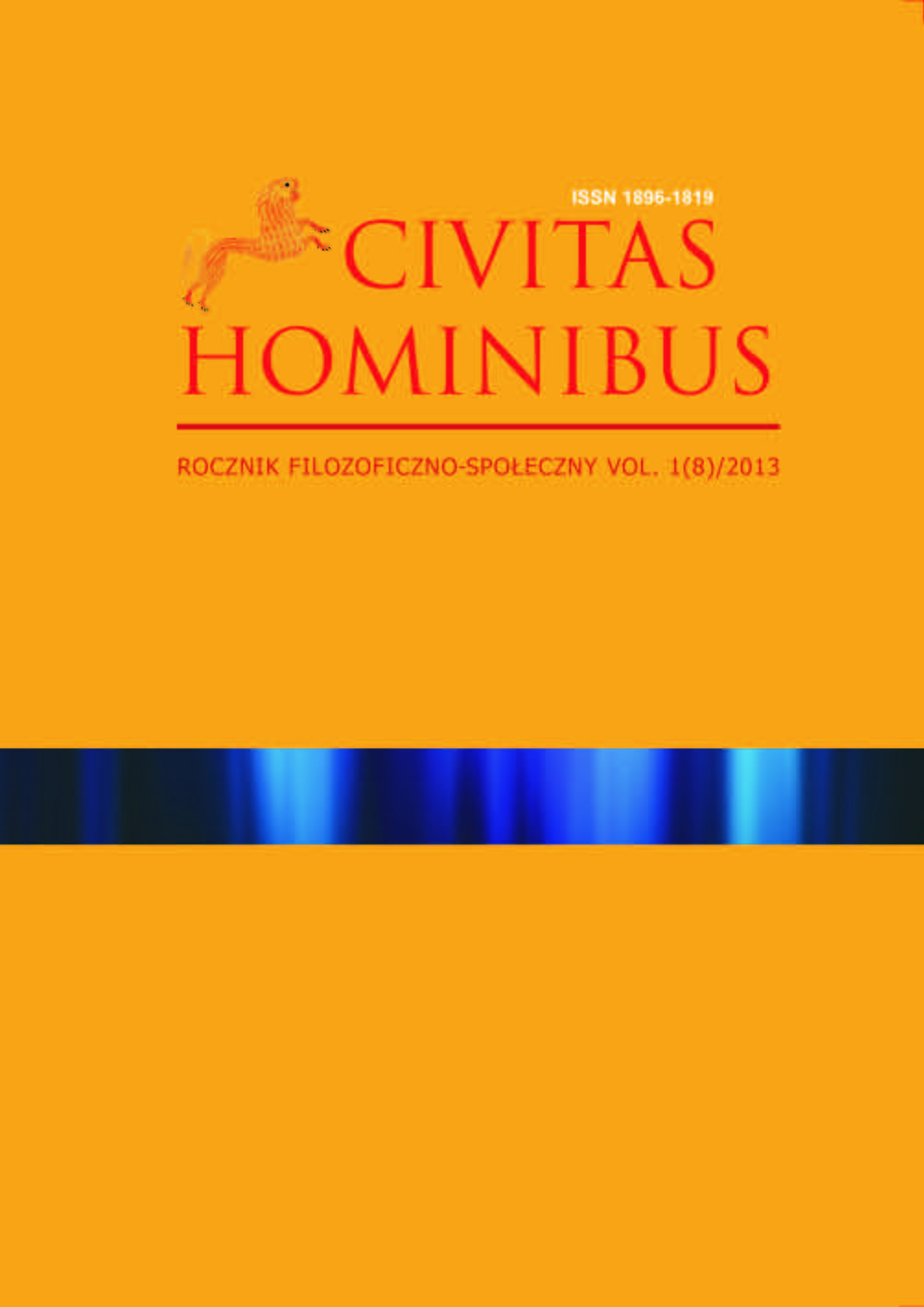Prawo czy wojna narodów? Rawls kontra Elshtain w sprawie Universal Justice
DOI:
https://doi.org/10.25312/Słowa kluczowe:
teoria sprawiedliwości, społeczeństwo różnorodne, polemika, Rawls vs ElshtainAbstrakt
Czy to możliwe, aby ustanowić równość, wolność i sprawiedliwość w społeczeństwie złożonym z osób, których koncepcje życia charakteryzują się różnorodnością wynikającą z filozoficznych, moralnych i religijnych sporów dotyczących charakteru i treści „dobra wspólnego”? Teoretycznie rzecz biorąc, przełomową odpowiedź na to pytanie dało dzieło Johna Rawlsa „Teoria sprawiedliwości” wyznaczające procedury i zasady stworzenia sprawiedliwego i pluralistycznego społeczeństwa. Jednakże w odpowiedzi na powyższe pytanie autor oprócz prac Rawlsa koncentruje się także na działach Jean Bethke Elshtain, która zajmuje się podobnymi kwestiami z zupełnie innej perspektywy, łącząc teorię polityczną ze stosunkami międzynarodowymi.
Ramy artykułu wyznacza więc teoria sprawiedliwości Rawlsa oraz teorie Elshtain zorientowane wokół argumentów religijnych odnoszących się do politycznego porządku światowego.
Pobrania
Bibliografia
Barry B., The Liberal Theory of Justice: A Critical Examination of the Principal Doctrines in A Theory of Justice by John Rawls, Clarendon Press, Oxford 1973.
Benhabib S., The Law of Peoples, Distributive Justice, and Migrations, “Fordham Law Review”, 2004, 72(5), p. 1761–1787.
Boucher D., Uniting What Right Permits with What Interest Prescribes: Rawls’s Law of Peoples in Context, [in:] R. Martin, D. Reidy (eds.), Rawls’s Law of Peoples: A Realistic Utopia?, Blackwell Publishing, Oxford 2006.
Brown C., John Rawls, “The Law of Peoples,” and International Political Theory, “Ethics and International Affairs”, 2000, 14(1), p. 125–132.
Buchanan A., Rawls’s Law of Peoples: Rules for a Vanished Westphalian World, “Ethics”, 2000, 110 (4), p. 697–721.
Cabrera L., Toleration and Tyranny in Rawls’s “Law of Peoples”, “Polity”, 2001, 34(2), p. 163–179.
Cohen J., Nagel T., Introduction` [in:] T. Nagel (ed.), A Brief Inquiry into the Meaning of Sin and Faith, Harvard University Press, Cambridge 2009.
Elshtain J.B., Against the New Utopianism, “Studies in Christian Ethics”, 2007, 20(1), p. 44–54.
Elshtain J.B., International Justice as Equal Regard and the Use of Force, “Ethics and International Affairs”, 2003, 17(2), p. 63–75.
Elshtain J.B., Just War Against Terror: The Burden of American Power in A Violent World, Basic Books, New York 2004.
Elshtain J.B., On Never Reaching the Coast of Utopia, “International Relations”, 2008, 22(2), p. 147–172.
Elshtain J.B., Sovereignty, Identity, Sacrifice, “Social Research”, 1991, 58(3), p. 545–564.
Elshtain J.B., Sovereignty: God, State, and Self, Basic Books, New York 2008.
Elshtain J.B., The Dignity of the Human Person and the Idea of Human Rights: Four Inquiries, “Journal of Law and Religion”, 1999–2000, 14(1), p. 53–65.
Elshtain J.B., The Responsibility of Nations: A Moral Case for Coercive Justice, “Daedalus”, 2003, 132(1), p. 64–72.
Elshtain J.B., Toleration, Proselytizing, and the Politics of Recognition, [in:] Th. Banchoff (ed.), Religious Pluralism, Globalization and World Politics, Oxford University Press, Oxford and New York 2008.
Gregory E., Before the Original Position: The Neo-Orthodox Theology of the Young John Rawls, “Journal of Religious Ethics”, 2007, 35(2), p. 179–206.
Habermas J., Reconciliation through the Public Use of Reason: Remarks on John Rawls’s Political Liberalism, “The Journal of Philosophy”, 1995, 92(3), p. 109–131.
Kukathas Ch., Rawls: A Theory of Justice and Its Critics, Stanford University Press, Stanford 1990.
Langan J., The Elements of Saint Augustine’s Just War Theory, “The Journal of Religious Ethics”, 12(1) 1984, p. 19–38.
Macedo S., What Self-Governing Peoples Owe to One Another: Universalism, Diversity, and the Law of Peoples, “Fordham Law Review”, 2004, 72(5), p. 1721–1738.
Martin, R., Reidy D., (eds), Rawls’s Law of Peoples: A Realistic Utopia?, Blackwell Publishing, Oxford 2006.
Niebuhr R., The Children of Light and The Children of Darkness,Charles Scribner’s Sons, New York 1960.
O’Driscoll C., Jean Bethke Elshtain’s Just War Against Terror: A Tale of Two Cities, “International Relations”, 2007, 21(4), p. 485–492.
Pabst A., Unholy War and Just Peace: Religious Alternatives to Secular Warfare, “The Politics and Religion Journal”, 2009, 2, p. 209–235.
Rawls J., A Brief Inquiry into the Meaning of Sin and Faith, Thomas Nagel (ed.), Harvard University Press, Cambridge 2009.
Rawls J., A Theory of Justice, Harvard University Press, Cambridge [1971] 1999.
Rawls J., The Law of Peoples, 4th edition, Harvard University Press, Cambridge 2002.
Rawls J., The Law of Peoples, “Critical Inquiry”, 1993, 20(1), p. 36–68.
Reidy D.A., Rawls on International Justice: A Defense, “Political Theory”, 2004, 32(3), p. 291–319.
Santurri E.N., Global Justice After the Fall: Christian Realism and the “Law of Peoples”, “Journal of Religious Ethics”, 2005, 33(4), p. 783–814.
Schilbrack K., Just War on Terror, “The Journal of American Academy of Religion”, 2006, 74(2), p. 539–543.
Sterba J. B., Rawls and Religion, [in:] V. Davion, C. Wolf (eds.), The Idea of a Political Liberalism: Essays on Rawls, Rowman and Littlefield, Oxford 2000.
Weithman P., Rawlsian Liberalism and the Privatization of Religion: Three Theological Objections Considered, “The Journal of Religious Ethics”, 1994, 22(1), p. 3–28.
Pobrania
Opublikowane
Numer
Dział
Licencja
Prawa autorskie (c) 2013 Akademia Humanistyczno-Ekonomiczna w Łodzi

Utwór dostępny jest na licencji Creative Commons Uznanie autorstwa – Na tych samych warunkach 4.0 Miedzynarodowe.



